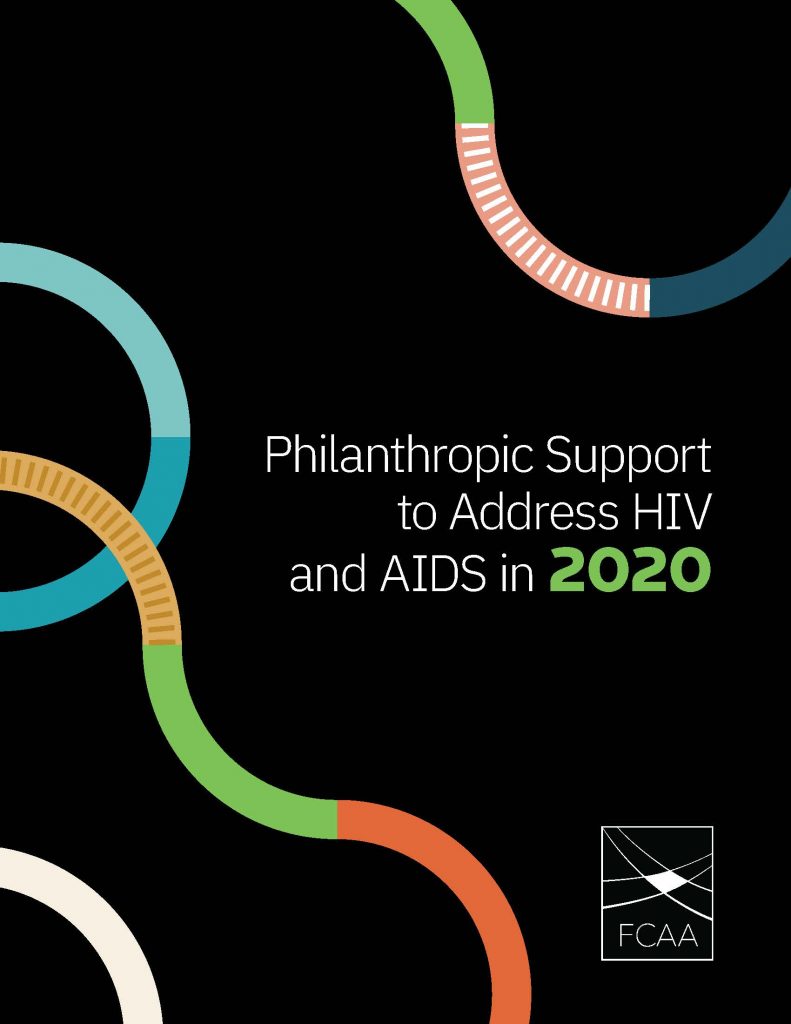Illusion of Steadiness Belies Worrisome Fluctuations in HIV-related Philanthropy
Report offers the first examination of HIV-related philanthropy’s response to the COVID-19 pandemic.
Washington, D.C., May 19, 2022 – Funders Concerned About AIDS (FCAA) today released its 19th annual Philanthropic Support to Address HIV and AIDS report. This year’s analysis shows that total HIV-related philanthropy in 2020 reached $707 million, representing an essentially flat, 1% increase from 2019. Looking a little deeper, the data reveals a dangerous reliance on a shrinking pool of funders.
Out of the 323 funders analyzed in the report, the top 20 account for 92% of the year’s total. Furthermore, the vast majority of funding (67%) came from the top two funders alone – Gilead Sciences, Inc. and The Bill & Melinda Gates Foundation. In fact, as a result of disbursement schedules – as opposed to sustained giving – a $116 million increase by Gilead ensured its spot as the No. 1 funder in 2020, marking the first time in 20 years that The Gates Foundation is not in that position. Gilead’s increase only served to balance out the absence of another funder’s one-time $100 million disbursement, which was tracked in the 2019 report. In addition, 13 of the top 20 funding organization’s reported decreased giving in 2020, and other longstanding private foundations exited the space and/or significantly reduced spending on HIV.
“The concentration of funding at the top is not a new headline, but it became starker in 2020,” said Channing Wickham, FCAA’s Board Chair and Executive Director of the Washington AIDS Partnership. “This is an enormous concern for the stability of HIV-related philanthropy. A shift in resources away from HIV, or other action with economic fallout from one of these top grant makers could devastate future funding levels.”
The report analyzes calendar year 2020 grantmaking that took place during the onset of the COVID-19 pandemic and ongoing racial tensions following the murder of George Floyd in the U.S. While it’s too soon to predict how these events, as well as the current war in Ukraine, will further impact HIV-related private funding, we do know they are compounding an already unstable environment.
There is, however, good news to report: many positive and responsive funder practices arose during the COVID-19 pandemic. FCAA identified roughly $66 million (9%) of HIV-related philanthropy that addressed COVID-19 efforts. This included unrestricted emergency funding in response to the pandemic, as well as personal protective equipment needs, research, access to HIV treatment and prevention medicine or services, support to strengthen community-based organizations’ infrastructure, and technology to shift to safe and remote services for both providers and clients.
“The efforts of HIV-informed funders to address the COVID-19 pandemic was a bright spot in this year’s report,” said Caterina Gironda, FCAA’s Research & Program Manager, and the report’s lead researcher and author. “Grantmakers understood the critical need for flexible and intersectional funding that is sensitive to the reality of people living multi-issue, multi-identity lives.”
FCAA also saw an uptick in funding for persons with psychosocial disabilities—roughly $7.2 million—which is notable given that this population has never received a significant level of resources in previous years. While just a third of those resources ($2.8 million) was specifically earmarked as related to the COVID-19 pandemic, it is likely that the increased attention to persons with psychosocial disabilities was an intentional funding strategy in response to the heightened isolation and devastating circumstances due to COVID.
Despite the overall stagnation of HIV-related philanthropy in 2020, resources did increase in other notable areas, including:
- General operating support ($55 million, a 27% increase from 2019)
- Capacity building/leadership development ($67 million, a 38% increase)
- Advocacy ($131 million, a 38% increase, and all-time high), and
- Funding for key populations[1] ($139 million, an 11% increase).
“Given the disproportionate burden that marginalized populations carry in the face of multiple pandemics, we hope to see continued use of, and sustained funding for, these strategies,” said Gironda.
Read the full report here.
About the Philanthropic Support to Address HIV and AIDS Report
FCAA first began its annual analysis of private funding to address HIV and AIDS in the year 2000. The current report captures data on more than 5,000 grants, awarded by 323 foundations in 10 countries, and identifies gaps, trends, and opportunities in HIV-related philanthropy. Sharing this study with funders enables them to make informed decisions about where their resources would make the most difference.
About FCAA
Funders Concerned About AIDS (FCAA) is a philanthropy-serving organization (PSO) founded in 1987 to take bold actions and push philanthropy to respond to HIV. FCAA informs, connects, and supports philanthropy to mobilize resources to end the global HIV pandemic and build the social, political and economic commitments necessary to attain health, human rights, and justice for all.
[1] For the purposes of FCAA’s resource tracking analysis, the term key populations includes grants marked for the following population categories: gay men/men who have sex with men, people who inject drugs, transgender people, sex workers, and general LGBTQ communities. FCAA also includes grants marked for key affected populations (unspecified), where the term ‘key populations’ is referenced in some manner, but no specific populations are identified. FCAA acknowledges that the term key populations often encompasses other populations dependent on the country and region of context.
